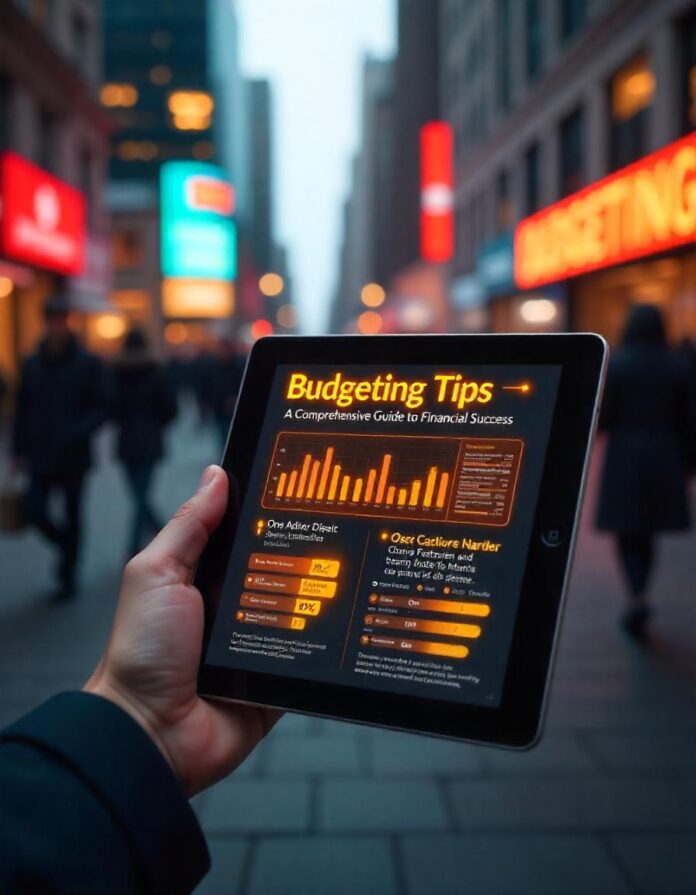In today’s rapidly evolving financial landscape, effective budgeting tips is no longer optional; it is a necessity. With inflation affecting daily costs, interest rates climbing, and economic uncertainty becoming a norm, the ability to manage one’s finances effectively determines financial stability and long-term success.
According to a 2024 report from Bankrate, only 32% of Americans maintain a detailed household budget, despite 74% admitting they feel financial anxiety on a regular basis. This gap reveals a significant opportunity for individuals to take control of their finances by implementing effective budgeting strategies.
This comprehensive guide outlines everything you need to know about budgeting, from its importance and structure to advanced planning strategies and tools. Whether you’re just starting your financial journey or looking to improve your current system, these budgeting tips will help you make more informed, sustainable decisions.
The Importance of Budgeting Tips in 2025
Budgeting is the process of creating a plan to manage income, expenses, savings, and financial goals. It involves understanding where your money comes from, where it goes, and how to allocate it in a way that supports your lifestyle and financial objectives.
Why Budgeting Matters:
- Financial Awareness: Budgeting tips provides clarity on income and expenses, helping avoid overspending.
- Goal Achievement: Allows prioritization of short-term and long-term financial goals.
- Emergency Preparedness: Enables creation of an emergency fund.
- Debt Reduction: Offers a structured way to pay off credit cards, loans, or mortgages.
- Mental Health: Reduces financial stress, which is one of the leading causes of anxiety among adults, as reported by the American Psychological Association (APA).
Step-by-Step Guide to Creating a Budget
1. Identify Your Total Income
With budgeting tips you can build a solid budget, start by calculating your net income—your earnings after taxes. Include:
- Salary and wages
- Side hustle or freelance income
- Rental income
- Dividends and investment income
- Government benefits
For those with variable incomes (e.g., freelancers), use a conservative monthly average from the past six months.
2. Track and Categorize Expenses
You cannot manage what you don’t measure. Track every expense for at least a full month. Categorize into:
- Fixed expenses: Rent, utilities, insurance premiums
- Variable expenses: Food, transportation, utilities
- Discretionary spending: Entertainment, subscriptions, dining out
A 2024 survey by NerdWallet found that the average American household spends over $3,000 annually on dining out—an area where simple awareness can drive significant savings.
3. Define Financial Goals
Goals give your budget direction. Split them into:
- Short-term goals (within 1 year): Emergency fund, vacation, small debt payoff
- Medium-term goals (1–5 years): Down payment on a home, starting a business
- Long-term goals (5+ years): Retirement, college savings
Use SMART goals—specific, measurable, achievable, relevant, and time-bound—for effective tracking.
4. Choose a Budgeting Method
Popular budgeting methods include:
The 50/30/20 Rule
This method allocates:
- 50% of income to needs
- 30% to wants
- 20% to savings and debt repayment
This simple formula is effective for most middle-income earners.
Zero-Based Budgeting
Every dollar of income is assigned a role, ensuring your income minus expenses equals zero.
Envelope System
Cash is placed into envelopes for each category. Once the envelope is empty, spending stops in that category.
Pay Yourself First
Savings and investments are prioritized before any other spending occurs.
5. Create the Budget Framework
Using your income and expense data, create a spreadsheet or use a digital tool to allocate monthly income across all categories, including savings.
6. Monitor and Adjust Regularly
Budgets are not static. Review monthly:
- Are your goals on track?
- Are you consistently overspending in certain categories?
- Has your income or expenses changed?
Adjust your budget as necessary to remain aligned with your goals.
Advanced Budgeting Tips for Different Life Scenarios
Budgeting on a Fixed Income
Those on pensions, disability, or retirement plans need a strict and consistent budgeting approach:
- Prioritize essentials first
- Keep a 3–6 month emergency fund
- Monitor healthcare costs, which account for nearly 15% of expenses for retirees according to the U.S. Bureau of Labor Statistics (BLS)
Budgeting with Irregular Income
If your income fluctuates:
- Base your budget on your lowest earning month
- Prioritize needs and minimum debt payments
- Maintain a buffer account to manage income dips
Budgeting as a Student
Students often face limited income and high expenses. Tips include:
- Track every purchase, especially food and entertainment
- Budget student loans like income, allocating only what’s needed per semester
- Use student discounts strategically
Budgeting for Families
Families face fluctuating expenses such as child care, healthcare, and education:
- Use joint budgeting apps to stay coordinated
- Plan for seasonal costs like school supplies and holidays
- Allocate a portion of the budget to future family-related needs (e.g., college funds)
Budget Planning for Specific Financial Goals
Saving for a Down Payment
According to Zillow, the average U.S. home price is $348,000 in 2025, meaning a 20% down payment equals $69,600. To budget for this:
- Open a separate high-yield savings account
- Set automated monthly deposits
- Cut back on non-essentials and redirect the savings
Paying Off Credit Card Debt
Americans owe an average of $6,501 in credit card debt per person (Experian, 2024). To reduce it:
- Use the debt snowball (smallest balance first) or avalanche (highest interest rate first) method
- Consider consolidating debt into a lower-interest personal loan
- Stop charging new purchases until current debt is repaid
Budgeting for Retirement
The Fidelity Retirement Savings Guidelines suggest having:
- 1x your salary saved by age 30
- 3x by 40
- 6x by 50
- 10x by 67
To reach these benchmarks:
- Contribute to 401(k)s or IRAs monthly
- Take advantage of employer matching
- Increase contributions after raises
Tools and Technology to Support Your Budget
Digital tools can simplify budgeting, automate tracking, and send alerts. Top choices include:
Mint
- Tracks spending and bills automatically
- Offers free credit monitoring
You Need A Budget (YNAB)
- Based on zero-based budgeting
- Encourages future planning
Personal Capital
- Combines budget tracking with investment monitoring
- Ideal for higher-income earners or families
EveryDollar
- Created by Dave Ramsey’s team
- Simple, clean interface for zero-based budgeting
Many of these tools are free or offer affordable plans with advanced features like real-time account syncing, net worth calculators, and debt payoff projections.
Common Budgeting Mistakes to Avoid
Mistakes are a part of the learning process, but awareness can minimize them.
1. Underestimating Expenses
Forgetting to include things like gifts, annual fees, or car maintenance can derail your budget.
2. Not Adjusting for Life Changes
Major events like a job change, new baby, or move should trigger a budget review.
3. Neglecting Emergency Savings
Unexpected expenses are inevitable. The Federal Reserve reports that 32% of Americans couldn’t cover a $400 emergency expense without borrowing.
4. Budgeting Too Rigidly
Extreme restrictions can lead to burnout. Allow a reasonable “fun” budget to remain motivated.
5. Failing to Review Regularly
Monthly reviews ensure the budget is realistic and in line with current priorities.
Incorporating Budgeting into Your Lifestyle
Budgeting should not feel like punishment. Treat it as a habit-building exercise.
Create a Weekly Money Ritual
Set aside 15–30 minutes weekly to:
- Check your balances
- Update expenses
- Review your goal progress
Use Visual Aids
Budget calendars, graphs, and goal progress bars can provide motivation and clarity.
Include the Whole Household
If you live with a partner or have a family, budgeting is a team sport. Set shared goals and have open conversations.
Budgeting and Mental Health
A 2023 survey by CNBC and Acorns found that 61% of adults say financial issues cause significant stress. Budgeting, however, can alleviate that.
Positive Psychological Effects:
- Improved decision-making
- Reduced anxiety over expenses
- Increased feelings of control and autonomy
The Budgeting empowers you to act instead of react to financial challenges, giving you a sense of direction and control.
Budgeting Tips and Income Growth

This budgeting is not only about managing what you have — it’s about optimizing and increasing income.
Tips to Grow Your Budget:
- Freelance or start a side hustle
- Request a raise after performance reviews
- Sell unused items
- Learn high-paying skills via online courses
For actionable resources on building income streams, check out this guide to starting an online business, where you’ll find tools and strategies to create scalable income.
Frequently Asked Questions (FAQs)
What is the best budgeting method?
The best method is the one that works for your personality and lifestyle. The 50/30/20 rule is simple, while zero-based budgeting offers full control.
How often should I review my budget?
At least once per month. Review weekly for more control or if you’re pursuing aggressive savings or debt goals.
How much should I save every month?
Ideally, save at least 20% of your income. If you can’t, start smaller and increase gradually.
Can I still budget if my income is irregular?
Yes. Use your lowest average monthly income to create a conservative baseline and prioritize a buffer fund.
Should I use credit cards while budgeting?
Yes, but only if you pay the balance in full each month. Use rewards and track spending carefully.
Conclusion
Budgeting is not about deprivation — it’s about intentional living. A well-structured budget lets you take control of your money, eliminate debt, prepare for emergencies, and achieve your dreams.
This budgeting tips has walked you through the core steps, tools, and strategies of effective budgeting. Whether you’re aiming to buy your first home, retire early, or simply stop living paycheck to paycheck, applying these budgeting tips will move you forward.
Start today by tracking your expenses, defining your goals, and choosing a budgeting method that suits your life. Make adjustments as needed, and remember: progress matters more than perfection.


